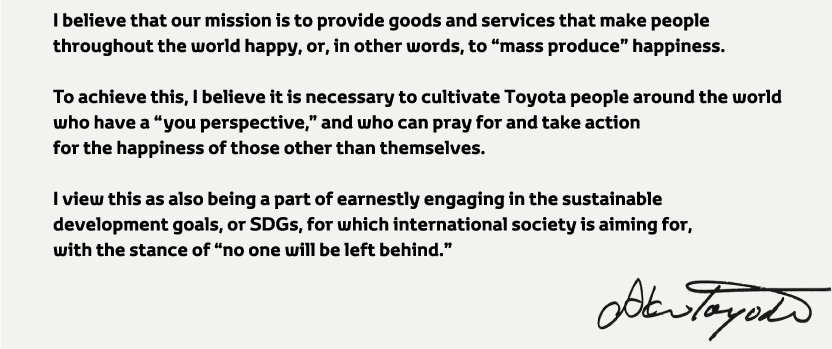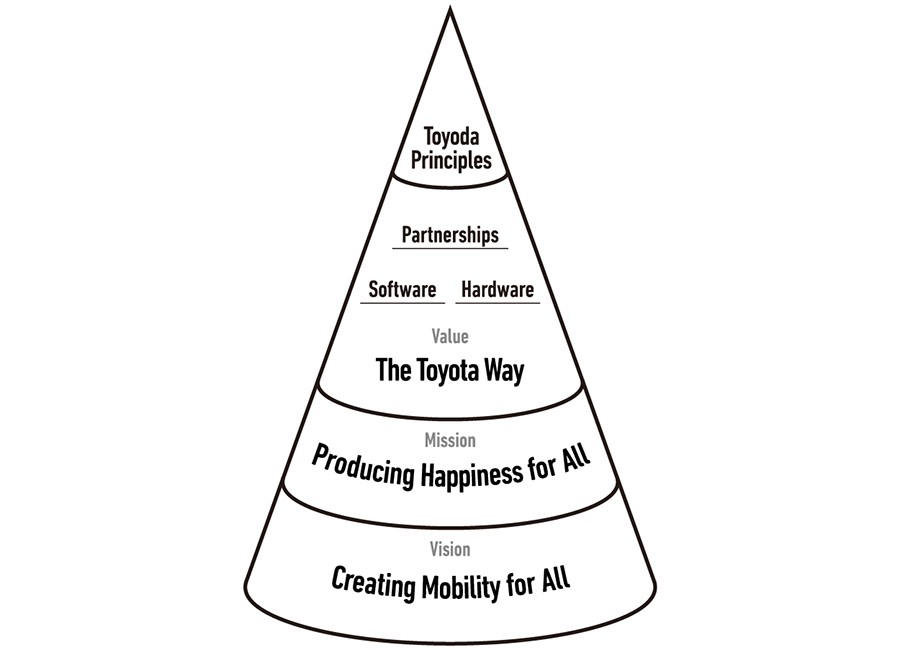Sustainability
LATEST UPDATES
- 2026/02/24
- "Resource Recycling" updated
- 2026/02/16
- "Sustainability Related Policies and Guidelines" (Toyota Green Procurement Guidelines) updated
- 2026/01/23
- "Information Security" updated
- 2025/10/30
- "Sustainability Data Book" updated
Sustainability Fundamental Policy
Contribution toward Sustainable Development
We, Toyota Motor Corporation and our subsidiaries, have inherited the spirit of "Toyoda Principles" since our foundation, and have aimed to create a prosperous society through our business activities, based on "the Guiding Principles at Toyota." In 2020, based on these Principles, we compiled the "Toyota Philosophy" and set the mission of "Producing Happiness for All." We aim to be the "best company in town" that is both loved and trusted by the people.
We will contribute to the sustainable development of our society/planet by promoting sustainability, as we have, under the "Toyota Philosophy," based on the Sustainability Fundamental Policy and individual policies.
Customers
Based on our "Customer First" philosophy, we develop and provide innovative, safe, and outstanding high-quality products and services that meet a wide variety of customer demands to enrich the lives of people around the world. (Guiding Principles: 3 and 4)
We will endeavor to protect the personal information of customers and everyone else we are engaged in business with, in accordance with the letter and spirit of each country and region's privacy laws. (Guiding Principle: 1)
Employees
We respect our employees and believe that the success of our business is led by each individual's creativity and solid teamwork. We support personal growth for our employees. (Guiding Principle: 5)
We support equal employment opportunities and diversity and inclusion for our employees. We do not discriminate against them. (Guiding Principle: 5)
We strive to provide fair working conditions and to maintain a safe and healthy working environment for all our employees. (Guiding Principle: 5)
We respect and honor the human rights of people involved in our business and, in particular, do not use or tolerate any form of forced or child labor. (Guiding Principle: 5)
Through communication and dialogue with our employees, we build and share the value "Mutual Trust and Mutual Responsibility," working together for the success of our employees and the company. We recognize our employees' right to freely associate, or not to associate, complying with the laws of the countries and regions in which we operate. (Guiding Principle: 5)
Management of each company takes leadership in fostering a corporate culture and implementing policies that promote ethical behavior. (Guiding Principles: 1 and 5)
Business Partners
We respect our business partners such as suppliers and dealers and work with them through long-term relationships to realize mutual growth based on mutual trust. (Guiding Principle: 7)
Whenever we seek a new business partner, we are open to any and all candidates, regardless of nationality or scale of the company, and evaluate them based on their overall strengths. (Guiding Principle: 7)
We maintain fair and free competition in accordance with the letter and spirit of each country and region's competition laws. (Guiding Principles: 1 and 7)
Shareholders
We strive to enhance corporate value while achieving stable and long-term growth for the benefit of our shareholders. (Guiding Principle: 6)
We provide our shareholders and investors with timely and fair disclosure on our operating results, financial condition and non-financial information. (Guiding Principles: 1 and 6)
Global Society / Local Communities
Environment
We aim for growth that is in harmony with the environment by seeking to minimize the environmental impact of our business operations, such as by working to reduce the effect of our vehicles and operations on climate change and biodiversity. We strive to develop, establish, and promote technologies that enable the environment and economy to coexist harmoniously, and to build close and cooperative relationships with a wide spectrum of individuals and organizations involved in environmental preservation. (Guiding Principle: 3)
Community
We implement our philosophy of respect for people by honoring the culture, customs, history, and laws of each country and region. (Guiding Principle: 2)
We constantly pursue safer, cleaner, and improved technologies that satisfy the evolving needs of society for sustainable mobility. (Guiding Principles: 3 and 4)
We do not tolerate bribery of or by any business partner, government agency, or public authority, and maintain honest and fair relationships with government agencies and public authorities. (Guiding Principle: 1)
Social Contribution
Wherever we do business, we actively promote and engage, both individually and with partners, in social contribution activities that help strengthen communities and contribute to the enrichment of society. (Guiding Principle: 2)
ReferenceMain sustainability-related individual policies
Toyota Philosophy
Toyota's founding spirit and its signpost in transition to a mobility company.
Topics
Nov. 19, 2025
Toyota awarded the Gold Prize in PRIDE INDEX 2025*
Toyota was awarded the Gold Prize in PRIDE INDEX for the fifth year in a row, presented by "work with Pride", one of the volunteer associations supporting the facilitation and establishment of diversity management of sexual minorities such as LGBTQ+.
We consider diversity, equity, and inclusion to be a key element of our business infrastructure and are working to create a welcoming workplace where employees with diverse skills and values, regardless of gender, age, nationality, race, ethnicity, creed, religion, sexual orientation, gender identity, disability, marital or family status, can demonstrate their abilities to the fullest and achieve self-fulfillment.
| * |
What is the "PRIDE INDEX" The index evaluates initiatives and awards three levels (Gold, Silver, Bronze) according to an overall score based on the following five indicators.
|
|---|
Apr. 09, 2025
Toyota Recognized as a White 500*1 enterprise under the Certified Health & Productivity Management Organization Recognition Program for the Eighth Consecutive Year and as a Sports Yell Company 2025+*2
To produce happiness for all, Toyota is committed to creating an attractive workplace where employees with wide-ranging skills and values can demonstrate their abilities to the fullest. In line with its health-related philosophy and policy,*3 Toyota promotes strategic initiatives in collaboration with each workplace and affiliated company and makes constant improvements by reviewing each measure.
In recognition of these efforts, in March 2025, Toyota was recognized as a White 500 enterprise under the Certified Health & Productivity Management Organization Recognition Program (goal of recognizing over 500 organizations for positive policies), which is jointly implemented by the Ministry of Economy, Trade and Industry and Nippon Kenko Kaigi. This is the eighth consecutive year Toyota has been so recognized.
In addition, as part of its efforts to promote employee health, Toyota is working to provide exercise support to all employees to improve physical fitness and help prevent illness. Toyota was recognized by the Japan Sports Agency as a Sports Yell Company 2025+ for such efforts, which include daily workplace exercise practices, exercise habit awareness-raising through videos and apps, practical skills guidance according to physical fitness, and workplace sports events.
Toyota will continue these efforts to further promote health and productivity management based on the Declaration of Health Commitment by top management. The company recognizes that employees are valuable assets, that the physical and mental health of employees are driving forces behind its good performance, and that happiness for all employees is vital.
| *1 | White 500 https://www.meti.go.jp/policy/mono_info_service/healthcare/kenkoukeiei_yuryouhouzin.html (in Japanese) |
|---|---|
| *2 | Sports Yell Company https://www.mext.go.jp/sports/b_menu/houdou/jsa_00195.html (in Japanese)
|
| *3 | Philosophy and policy for health and safety https://global.toyota/en/sustainability/esg/health-safety/ |





